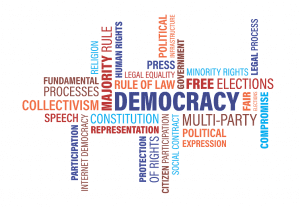 The Democracy Observatory has been established during a time where democracy around the world is increasingly threatened by external and internal enemies in order to contribute to the promotion and cultivation of the democratic idea. The discourse surrounding the decline of democracy is more and more evident nowadays. A simple Google search demonstrates that dozens of books and hundreds of articles have been published in recent years that contain the words "crisis" and "democracy."
The Democracy Observatory has been established during a time where democracy around the world is increasingly threatened by external and internal enemies in order to contribute to the promotion and cultivation of the democratic idea. The discourse surrounding the decline of democracy is more and more evident nowadays. A simple Google search demonstrates that dozens of books and hundreds of articles have been published in recent years that contain the words "crisis" and "democracy."
"Democratic transitions" are no longer on the agenda of the international media. The initial expectations created by the Arab Spring concerning the extension of liberal democracy to the area of North Africa and the Middle East were not implemented. Fukuyama's famous "proclamation" of "the end of history", in a euphoric environment that had been created in the early 1990s, after the collapse of real socialism, was not confirmed.
The tendency among countries that abandon authoritarian systems to adopt a liberal democratic system of government is decreasing which evidently demonstrates a disengagement from democracy. Democracy today faces an internal problem. Even in countries with a strong democratic tradition, such as the US, it has been proven that democracy can be threatened if leaders like Donald Trump come to power.
It could be affirmed that democracy today seems to be more "illiberal" than ever. The integrity of the process of free elections may not be called into question, but in a number of countries, from Putin's Russia, to Bolsonaro's Brazil and from Erdogan's Turkey to Orban's Hungary, crucial components of a healthy liberal democracy, such as respect for the separation of powers, freedom of the press and the functioning of the rule of law are being called into question.
Subsequently, and even in countries which are considered to be liberal democracies, many of them now face an endemic problem, which concerns the distancing of citizens from the democratic process, as expressed through the abstention from the electoral processes but also through the reduced trust of citizens in institutions of democratic representation, as recorded in a series of surveys. In recent years, this phenomenon has contributed to the rise of extreme political formations as well as to the emergence of an "anti-systemism" political model.
Modern democracy is facing challenges, that cannot be met, neither by anti-system policies, nor by instrumentalising the insecurity or accumulated frustration felt by citizens, at a time of constant and great change. As international experience illustrates, such policies do not solve the problem, they exacerbate it even more.
Solutions must be sought through the renewal and deepening of democracy and through the creation of conditions that will enhance accountability and transparency. This will, ultimately, prevent corruption and entanglement and will restore citizens' trust in democratic institutions while encouraging participation in the democratic process.
The Democracy Observatory aims to offer the possibility for systematic monitoring of international trends and the collection of comparative data regarding democracy on a global level. Among other things, the Observatory, and in addition to presenting relevant indicators that assess the level of democracy, will also present their own comparative tables and blueprints, providing a useful study tool for any interested party.
The Observatory will also host analytical texts and also aspires to create a "bank" of articles by distinguished writers and experts in the field of democracy studies where one can find new and important publications at a scientific and analytical level.
In addition, the Observatory aims to create a directory of institutes and non-governmental organisations dealing with democracy issues while also promoting collaborations, through the Institute, with similar organisations at a European and regional level.
Finally, the establishment of the "Institutional Confidence Index" for Cyprus, which concerns a research project currently being carried out by the Institute, is part of the Democracy Observatory (for more information press here).




